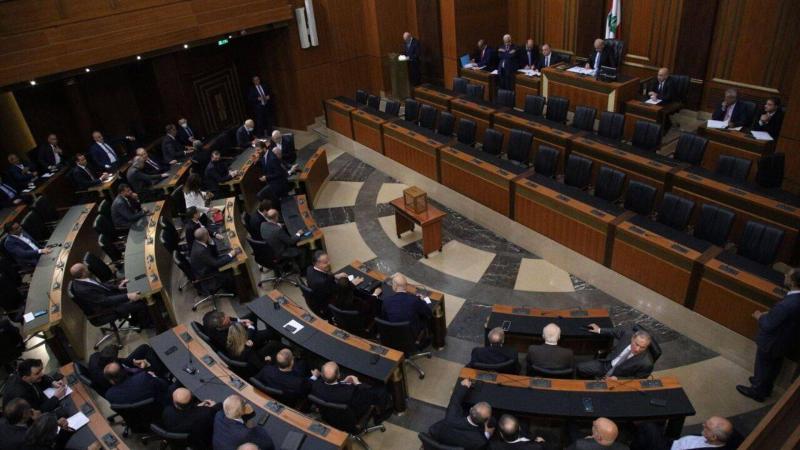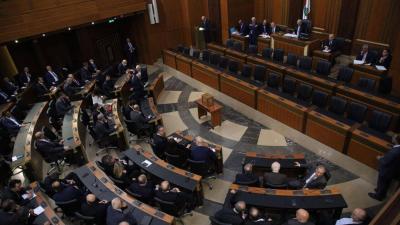Political developments and daily unfolding facts in Lebanon indicate that the state, society, and leaders are moving from one deterioration to another, without pause or respite for reflection or contemplation. The more urgent cries and enthusiastic anthems for salvation rise, the clearer it becomes that what is happening is merely further deterioration and regression.
Since the assassination of the Lebanese Forces official, Pascal Suleiman, political and media attention has shifted, driven particularly by the Lebanese Forces and allied parties such as the Kataeb and the Free Patriotic Movement, towards the issue of Syrian displacement and the urgent need to address it in any way possible. Meanwhile, the core issue of the dysfunctional state and the crumbling system remains evident, persistent, and worsening.
In truth, the issue of Syrian displacement is not a trivial matter; it is a fateful issue that cannot be overlooked or remained silent about. It impacts all Lebanese in its various dimensions. The focus on this problem has reached a point where all other issues in the country are forgotten, concentrating solely on this one. Observers of the media and news bulletins controlled by these political factions might believe that Syrian refugees are knocking on doors to occupy Lebanese homes.
The extent to which the focus has shifted to the Syrian displaced has led the two rival parties, the Lebanese Forces and the Free Patriotic Movement, to set aside their differences to convene together to address the issue of Syrian displacement through a joint municipal conference in Batroun. What political disputes had divided them in the past has been unified by the rising number of displaced individuals and the exacerbation of their problems. However, at the same time, other issues remain unaddressed.
These political forces have overlooked that the fundamental problem that has paralyzed the Lebanese political system and prevented its institutions from addressing this issue clearly and robustly from the outset is the same one currently obstructing serious solutions for the Syrian displacement crisis. With the outbreak of the crisis in Syria and the initial wave of Syrian refugees fleeing to Lebanon and neighboring countries, during the tenure of Prime Minister Najib Mikati, supporting forces close to the Syrian regime collaborated to ignore the problem and prevented state institutions from taking action.
It cannot be forgotten how many officials openly proclaimed that there was no issue in Syria, dismissing any acknowledgment of even a minor problem or a nascent revolution. The prevailing discussion was that there was no issue, that everything was normal, and that there was no need to take measures to manage the burdens of displacement and its associated problems.
The Lebanese state was, due to political and media intimidation allied with the Syrian regime, prevented from establishing organized refugee camps or taking any sound and necessary measures required under such circumstances. Practically, Syrian allies succeeded in blocking the Lebanese state from taking any actions to organize and confront the influx of Syrian refugees into Lebanon to prevent any stirring of the subject under the pretext that the situation in Syria was normal, that the regime was strong and stable, and there was no real problem there. Everything previously said about uprisings and revolutions facing the regime was merely a Western media and political fabrication without a genuine foundation!
Now, Premier Najib Mikati finds himself subjected to attacks and criticisms regarding the European aid and how to handle the displacement crisis, even though he faced immense pressure at that time to prevent his government from taking any steps to confront the mounting burdens and issues related to displacement—which was then rapidly escalating in Lebanon.
For these reasons, the state’s institutions have failed and even refrained from recording the entries of displaced individuals into Lebanon. In other words, the political forces that have historically paralyzed the political system and its institutions in Lebanon by preventing the application of the constitution and the rule of law are the same forces that are now obstructing the possibility of taking serious measures regarding the escalating displacement issue.
Before the parliamentary session convened to discuss the displacement problem and the escalating crisis and to approve recommendations for addressing this national disaster, Hezbollah Secretary-General Hassan Nasrallah spoke at length, explicitly suggesting that the Lebanese state should push Syrian refugees towards Europe by sea, echoing suggestions made by Gebran Bassil, which mirrored the actions of Turkey that had previously opened its borders to refugees heading to Europe via Greece.
In effect, the proposals by Nasrallah and subsequently by Bassil represent a significant shift towards transforming Lebanon from an exporter of art, culture, and entertainment to fostering a Somali and Yemeni-like experience of controlling and monopolizing the seas and sinking into chaos and entanglement. Furthermore, what Nasrallah revealed in his last speech encourages a reversal of Lebanon’s traditional aspirations to play the role of “Switzerland of the East” by acting in Syria’s favor and leveraging to lift the sanctions on it.
This new logic, as articulated by Nasrallah in his recent speech, indicates that he approached Syrian President Bashar Al-Assad, encouraging the return of displaced individuals to Qusayr but claimed that European-funded organizations were preventing them. He emphasized the need to assist Syria in preparing the situation for the return of the displaced, starting with lifting the sanctions against it, and asserted that official communication between the Lebanese government and the Syrian government is necessary to open doors for the return of the displaced.
The call from Nasrallah did not merely end with urging the lifting of sanctions against Syria, as this notion has since appeared to be part of a broader agenda. This was echoed and repeated by MP Tony Frangieh, who discussed the necessity of lifting sanctions on Syria, stating, "It is in Lebanon's interest to contribute or mediate if possible to lift sanctions against Syria, as lifting these sanctions would be beneficial to Lebanon in multiple aspects." He argued that the political solution to the displacement issue must involve dealing with the Syrian government, and the international resolution lies in lifting the sanctions, adding, "Life is a stand of dignity. Therefore, we say that if the aid aims to keep the displaced in Lebanon, we reject it and do not want it!"
So, the key word and the required upcoming task from Lebanon, according to Nasrallah and Frangieh, is to work towards lifting sanctions against Syria so it can receive the disallowed assistance. This would facilitate the return of those displaced to their homeland rather than remaining in Lebanon! The question remains: which recommendation will be adopted and implemented? What comes from the MPs or from the Sir and his allies?




